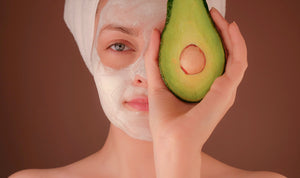Good Skin Comes From Within
Hello wonderful readers!
I hope you’re all well and enjoying the sunshine and warmth. If you haven’t yet read our last blog post on Vitamin D supplementation, now would be a great time to do so - especially with a heat wave on its way!
Today I’m going to talk about skin health, because who doesn’t want glowing, radiant skin? It’s all too easy these days to get caught up in marketing jargon and assume that a new face cream or treatment is going to give us the glow we want, and whilst it is true that some supplements and products will help, healthy skin really does come from within.
In the same way that ‘the eyes are the window to the soul,’ in Nutritional Therapy we talk about the skin being the window to the liver, bowel and kidneys. In other words, your body’s detoxification potential is linked to the health of your skin. When these three major routes out of the body are compromised, e.g. in poor gut health or an overburdened liver (think alcohol, chemical exposure, pollution), the body tends to use the skin as a major route of detox and that can either look like eczema, dry skin, acne, rosacea or just a dull and lifeless complexion.
This is really important because it means that how we choose to live our lives and what we put into our bodies really matters. Now if you’re reading this blog, it’s likely that you’re already pretty clued up as to what a healthy diet looks like but there are some key nutrients that we should look out for:
- Essential fatty acids Omega 3 and 6. My guess is that you’re getting plenty of omega 6s already (nuts, seeds, grains, avocado etc), but probably less of the omega 3s (oily fish, grass fed beef, pasture raised eggs). Although we need both in combination to be healthy, too many omega 6s cause inflammation in the body, whereas the omega 3s are always anti-inflammatory. The worst culprit in the modern diet for omega 6 excess is processed seed oils such as rapeseed and sunflower seed oil (in every pre-packaged food item). This is important for skin health - make sure you’re consuming oily fish twice a week, ideally the smaller fish like mackerel and sardines, or taking a good quality supplement that’s been tested for heavy metal contamination - Bare Biology is my go to here.
- The fat soluble vitamins A, D, E and K. If you’re consuming a broad and varied diet that’s based around plant and animal foods, then you’ll likely be okay in this regard. Vitamin A in its active form is called retinol, and we can only get it from animal foods. Beta Carotene from orange vegetables is a precursor to retinol, but not all of us can make the conversion adequately, hence it’s much safer to be an omnivore. Vitamin D is synthesised via sunlight and many of us are deficient because we’re always covered up or wearing sunscreen. Have a read of the last blog post on Vitamin D to understand more about this complex vitamin (actually, it’s a hormone!).
Now besides a nutrient-dense diet (lots of color, diversity, good fats and quality protein), there are some things we should think about to support liver, kidney and gut health - all of which will affect skin immensely.
Lymph System Support
Your lymph system works tirelessly to transport cellular waste and support detoxification. If you’ve ever had a lymphatic drainage massage then you’ll know how supportive it can be for overall health, but also for reducing puffiness across the surface of the skin. It’s also a really important part of the immune system too, so daily practices like dry body brushing, cold exposure (even just ice water on the face), and movement are really helpful. The Lymph system doesn’t have its own in-built pump like our circulatory system (the heart muscle), and it relies on physical manipulation. So a sedentary lifestyle stagnates your lymph fluid, but movement, exercise, jumping up and down and going from hot to cold (e.g. ice bath, sauna, and back) really benefit it.
Liver Support
Your liver is your main organ of detox and the health of this amazingly complex organ will have a drastic effect on the appearance of your skin. Contrary to what you might think, the liver doesn’t need copious green juices, cleanses and lemon water to do its job effectively, it actually needs good quality nutrition.
For example, the CYP enzymes in phase one liver detox require a lot of cofactors (different chemical compounds), and yes, these all come from our diet, in particular the B vitamins, glutathione, magnesium, zinc and copper among many others. The second phase of detox in the liver is called conjugation. It’s where toxins that have been worked on in phase one by the CYP enzymes get conjugated (attached) to molecules of protein so that they can then be excreted from the body. So even something as simple as insufficient protein intake, as in a fast or a cleanse, can impair detoxification.
These important vitamins, minerals and amino acids from quality sources of protein, are found in a wholefood diet that ideally includes the most nutrient dense foods: seafood, animal products, veg etc . So it makes sense to firstly be cooking a lot from scratch (and, incidentally, steaming your veggies or making a soup is far better for maintaining their nutrient content than frying or roasting), and eliminating some of the ‘big players’ that hinder detox. For example, too much sugar and alcohol. If you find it relatively simple to eliminate these two things, then you might want to experiment with dairy and gluten if you have reason to believe that you’re suffering from any sort of inflammation. But aside from knowing whether you have any dietary triggers, detox is actually more about what you can add in, not what you can take away - which is why juice cleanses and fasts aren’t helpful in the slightest. Adding in an organic, cold pressed juice to an already nutrient dense diet, on the other hand, can be really helpful.
Food is extremely powerful for detoxification, and in this sense can be seen as a demonstrable form of ‘food is medicine.’
There are now multiple, reputable studies that demonstrate foods and nutrients can change the way the body converts and excretes toxins from the body. In general, findings indicate that specific foods may increase the speed or balance metabolic pathways to assist with toxin
biotransformation and subsequent elimination.
Some of these foods are:
- Cruciferous Vegetables (eg broccoli, brussel sprouts, cabbage, cauliflower, collard greens)
- Berries (blueberries, raspberries, blackberries, blackcurrants, currants etc)
- Garlic
- Spices (turmeric, ginger)
- Herbs (in particular, rosemary)
And finally, collagen. Is it all it’s cracked up to be?
Now whilst I’ve hopefully managed to convince you that there are no hugely quick fixes for skin health, there are a few things you can try from a supplement and skin care perspective. Vitamin A, as I mentioned earlier, is particularly important for healthy skin so adding a retinol serum to your facial skincare routine may help you get some quick results. I’m also a huge fan of collagen powder added to smoothies, hot drinks etc. It’s a hotly debated topic in the media and critics will say that when you consume it it just gets digested like a regular amino acid. However, there’s a study (done using rodents) called “Absorption and Effectiveness of Orally Administered Low Molecular Weight Collagen Hydrolysate in Rats” where they fed the rats a labeled version of collagen (meaning that they can actively track where the collagen went once it was ingested), and found that it did in fact end up in the bone, the hair and the connective tissue.
Marine collagen is your best bet for hair, skin and nails and bovine is better for connective tissue.
And don’t forget to hydrate!
@gracekingswell

